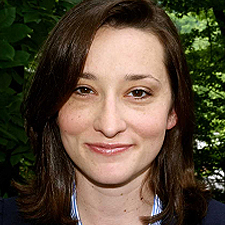
Mary Beth McConahey
2007 Publius Fellow
What is your current position?
I’m the Assistant Director of the Center for Political and Economic Thought at Saint Vincent College in Latrobe, Pennsylvania, where I teach in the Politics Department. Our work focuses on freedom, Western civilization, and the American experience. We run conferences and several lecture series, we publish an annual journal (Citizens and Statesmen), and we support various other educational activities.
What inspired you to choose this career path?
I’m very fortunate to find myself in this career. It allows me to spend most of my time reading books and talking about ideas with interesting people. The teaching part of my job is especially rewarding because every new semester is an opportunity to turn young students on to the American Founding—to spend four months taking them through the Declaration, The Federalist Papers, the speeches and writings of Washington, Jefferson, Lincoln. What could be better?
What are you currently working on?
I’m always planning. Right now, we’re lining up our 2018-2019 lectures. I’m also putting together a course on Women and Politics in America. In terms of my own work, I’m in the very early stages of a follow-up to my first book, The City and Sex: Private Vice and Public Scandal in the American Republic. Current events are forcing me into constant revision!
How did you hear about the Claremont Institute?
Hard to say! I’ve admired the Institute my whole adult life. I think I first experienced it through the CRB when I was about nineteen years old. One of my undergraduate professors, Brad Watson, always left copies lying around the department for students to take, and I always looked forward to snagging one. The riches to be discovered in those pages! They revealed to me an unfamiliar and fascinating world into which I hoped to sneak. In the summer after my first year of graduate school, I interned at the Institute, and then worked as Events Coordinator for a few years, during which time I was a Publius Fellow. Just like that, I infiltrated!
What’s your fondest memory of the Claremont Institute?
I have so many memories and they’re all happy! I’m very nostalgic about my time as an intern—those halcyon days! Working down the hall from Professor Jaffa seemed the realization of an impossible dream. He was always teaching and, as interns, we couldn’t even use the microwave without getting a pretty extensive lecture on Lincoln or Shakespeare or Aristotle or Aquinas or Churchill or all of them combined. It was awesome. Helping to organize the annual Churchill Dinners was fun, and meeting the Statesmanship Award recipients—Secretary Rumsfeld was my favorite—was always a real thrill. Of course, my time as a Publius Fellow was wonderful. Those two weeks in Newport with such bright students and such brilliant teachers will always be one of the coolest things I’ve done.
There are all sorts of educational programs out there for current and rising conservative professionals. What do you think makes the Claremont Institute’s Fellowships unique?
The seriousness of the scholarship and the importance of the mission. Plenty of think tanks are mobilizing young conservatives, but none understands as clearly or takes as seriously the principles of the Founding. Nobody else seems to see the big picture so well. And nobody else marshals the first-rate instruction that has always defined Claremont.
If you could have a drink with an American Founder, or any great thinker, who would it be, why, and what would you order?
Jefferson, maybe. In class I sometimes catch myself speculating, “If Thomas Jefferson were alive today, he’d probably say…” It would be nice to speak with certainty! Plus, Jefferson was quite the oenophile and maybe in this scenario we could get our hands on that infamous bottle of 1787 Th.J. Chateau Lafitte so he could clear up the matter of its ownership!
Who was more important for their time, George Washington or Abraham Lincoln? Why?
Without Lincoln, the whole project of the Framers would’ve been undone. He understood the Declaration and fulfilled its promise, proving self-government actually possible. Our republican robe had been trailed in the dust, as Lincoln said, and without his statesmanship it might never have been washed white. What’s the next question? Which of my children do I love more?
What is the greatest challenge facing the United States today?
I know I must sound curmudgeonly but I think it’s true that we’ve forgotten the indissoluble union between virtue and happiness…and between virtue and liberty.
What books are you reading right now?
I’ve got two going at the moment, both new to me. Stendhal’s The Red and The Black and Turgenev’s Fathers and Sons.

